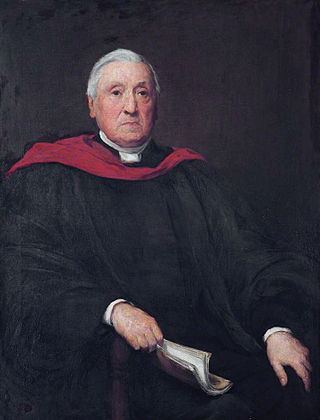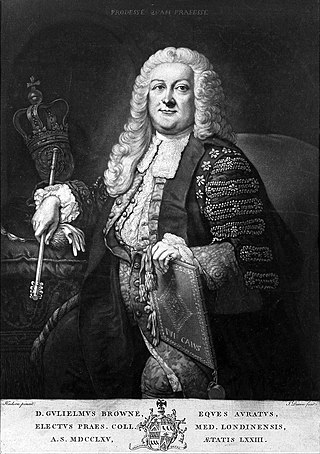Related Research Articles

An epigram is a brief, interesting, memorable, and sometimes surprising or satirical statement. The word is derived from the Greek ἐπίγραμμα epígramma "inscription" from ἐπιγράφειν epigráphein "to write on, to inscribe", and the literary device has been employed for over two millennia.

Benjamin Hall Kennedy was an English scholar and schoolmaster, known for his work in the teaching of the Latin language. He was an active supporter of Newnham College and Girton College as Cambridge University colleges for women.

The Greek Anthology is a collection of poems, mostly epigrams, that span the Classical and Byzantine periods of Greek literature. Most of the material of the Greek Anthology comes from two manuscripts, the Palatine Anthology of the 10th century and the Anthology of Planudes of the 14th century.

Samuel Butler FRS was an English classical scholar and schoolmaster of Shrewsbury School, and Bishop of Lichfield. His grandson was Samuel Butler (1835–1902), the notable author of the novel Erewhon.

Henry Montagu Butler was an English academic and clergyman, who served as headmaster of Harrow School (1860–85), Dean of Gloucester (1885–86) and Master of Trinity College, Cambridge (1886–1918).
James Hildyard was an English classical scholar.
George Waddington was an English priest, traveller and church historian.

William Alexander Greenhill was an English physician, literary editor and sanitary reformer.

Sir William Browne FRS was an English doctor.
James Bailey was an English classical scholar and schoolmaster.
Henry Drury (1812–1863) was an English churchman. He became Archdeacon of Wilts, England and Chaplain to the Speaker of the House of Commons.
Thomas Mackworth (1627–1696) of Betton Strange was an English politician of Shropshire landed gentry background. After limited military service on the Parliamentarian side in the Third English Civil War, he represented Shropshire in the House of Commons from 1656 to 1659 during the Second and Third Protectorate Parliaments.
Pegasides were nymphs of Greek mythology connected with wells and springs, specifically those that the mythical horse Pegasus created by striking the ground with his hooves.
Thomas Smart Hughes (1786–1847) was an English cleric, theologian and historian.

Walter George Headlam was a British classical scholar and poet, perhaps best remembered for his work on the Mimes of Herodas. He was described as "one of the leading Greek scholars of his time."
Anthony Rich was an English solicitor, author, antiquary and gentleman.

Robert Walpole (1781–1856) was an English classical scholar.
Robert Gregg Bury was an Irish clergyman, classicist, philologist, and a translator of the works of Plato and Sextus Empiricus into English.
In Greek mythology, Idaea or Idaia was, by some accounts, the daughter of the Scythian king Dardanus, and the second wife of Phineus, the king of Thrace. Idaea's false accusations against her stepsons were responsible for her husband's misfortunes. She was sent back to Scythia, where she was condemned to death. Other ancient sources give other names for Phineus' second wife, including: Eidothea, sister of Cadmus, and Eurytia.
Thomas Browne (1766–1832) was a priest and academic in the late eighteenth and early nineteenth centuries.
References
- ↑ Sir William Browne's Medals: Notice, Cambridge University Reporter, 7 November 2008
- ↑ Gentleman's Magazine , 1774, p.44. Quoted by Brown, Laurence, A catalogue of British historical medals 1760–1960, vol. I: the accession of George III to the death of William IV, London, Seaby Publications Ltd, 1980, p21.92
- ↑ "Statute E : TRUST EMOLUMENTS - Chapter VIII | Statutes and Ordinances of the University of Cambridge". admin.cam.ac.uk. Retrieved 18 February 2017.
- ↑ "Latin Translations by Classical Turns: Professional Aid, Lowest Prices – The Top Sir William Browne Medallists". web.archive.org. Archived from the original on 4 March 2016. Retrieved 18 February 2017.
{{cite web}}: CS1 maint: bot: original URL status unknown (link) - ↑ Bayne, Ronald (1887). . Dictionary of National Biography . Vol. 11. pp. 281–282.
- ↑ "Francis Wrangham (A Cambridge Alumni Database)". venn.lib.cam.ac.uk. Retrieved 18 February 2017.
- ↑ "Samuel Butler (A Cambridge Alumni Database)". venn.lib.cam.ac.uk. Retrieved 18 February 2017.[ permanent dead link ]
- ↑ A. T. Bartholomew, ed., Catalogue of the Books and Papers for the Most Part Relating to the University, Town, and County of Cambridge, Bequeathed to the University by John Willis Clark, M.A., Cambridge University Press, 2010
- ↑ John Venn, comp., Alumni Cantabrigienses: A Biographical List of All Known Students, Graduates and Holders of Office at the University of Cambridge, Volume 2, Cambridge University Press, 1954
- ↑ A guide through the town of Shrewsbury, London: John Davies, 1845
- ↑ A guide through the town of Shrewsbury, London: John Davies, 1845
- 1 2 Shuckburgh, Evelyn Shirley (1886). . Dictionary of National Biography . Vol. 05. pp. 230–231.
- ↑ A guide through the town of Shrewsbury, London: John Davies, 1845
- ↑ The Classical Journal. A.J. Valpy. 1815. p. 191. Retrieved 18 February 2017.
- ↑ A guide through the town of Shrewsbury, London: John Davies, 1845
- ↑ A guide through the town of Shrewsbury, London: John Davies, 1845
- ↑ A guide through the town of Shrewsbury, London: John Davies, 1845
- ↑ A guide through the town of Shrewsbury, London: John Davies, 1845
- ↑ A guide through the town of Shrewsbury, London: John Davies, 1845
- ↑ A guide through the town of Shrewsbury, London: John Davies, 1845
- ↑ A guide through the town of Shrewsbury, London: John Davies, 1845
- ↑ A guide through the town of Shrewsbury, London: John Davies, 1845
- 1 2 3 4 The Church of England Magazine. Vol. 11. J. Burns. 1841. p. 441. Retrieved 18 February 2017.
- 1 2 Nichols, J. (1842). The Gentleman's Magazine. Vol. 172. E. Cave. p. 76. Retrieved 18 February 2017.
- ↑ A guide through the town of Shrewsbury, London: John Davies, 1845
- ↑ A guide through the town of Shrewsbury, London: John Davies, 1845
- ↑ A guide through the town of Shrewsbury, London: John Davies, 1845
- ↑ "Westcott, Brooke Foss (A Cambridge Alumni Database)". venn.lib.cam.ac.uk. Retrieved 18 February 2017.[ permanent dead link ]
- ↑ Greek Ode Westcott, Brooke Foss (A Cambridge Alumni Database) [ permanent dead link ], Greek Ode
- ↑ "Huddleston, Tristram Frederick Croft (A Cambridge Alumni Database)". venn.lib.cam.ac.uk. Retrieved 18 February 2017.[ permanent dead link ]
- 1 2 3 4 5 Butler, S. (1896). The Life and Letters of Dr. Samuel Butler, Head-master of Shrewsbury School 1798-1836. Vol. 2. J. Murray. p. 392. Retrieved 18 February 2017.
- ↑ Oxbury, H. F. (23 September 2004). "Salt, Henry Shakespear Stephens (1851–1939), classical scholar and publicist" . Oxford Dictionary of National Biography (online ed.). Oxford University Press. doi:10.1093/ref:odnb/37932. ISBN 9780198614128 . Retrieved 3 July 2020.(Subscription or UK public library membership required.)
- ↑ Baldwin's auction listing
- ↑ "Nottinghamshire history > Nottinghamshire and Derbyshire at the Opening of the Twentieth Century; [and] Contemporary Biographies, (1901) > Legal". nottshistory.org.uk. Retrieved 18 February 2017.
- ↑ "University intelligence". The Times. No. 36077. London. 28 February 1900. p. 12.
- ↑ "Nothing of Importance, Bernard Adams (Forgotten Books 2012)". amazon.co.uk. Retrieved 18 February 2017.
- ↑ "Nothing of Importance: A Record of Eight Months at the Front With a Welsh Battalion, October, 1915, to June (Classic Reprint): Amazon.co.uk: Bernard Adams: Books". amazon.co.uk. Retrieved 18 February 2017.
- ↑ Obituary: Professor J. M. Cook. N.G.L. Hammond, The Independent , 22 October 2011. Retrieved 6 December 2015.
- ↑ Christie's auction listing, 1999
- ↑ The International Who's Who 2004. London and New York: Europa Publications, 2003, p. 60.
- ↑ Awards notice, Cambridge University Reporter, 8 March 2008.
- ↑ Curriculum Vitae: Thomas Ford, uni-koeln.academia.edu. Retrieved 13 January 2018.
- ↑ "Murray Edwards student awarded Sir William Browne Medal". murrayedwards.cam.ac.uk. Archived from the original on 4 March 2016. Retrieved 18 February 2017.
- ↑ "Alexander Hardwick (2013) awarded Sir William Browne's Medal for Latin Epigram". queens.cam.ac.uk. Retrieved 18 February 2017.
- 'The Browne Prize Medals', Bulletin of the History of Medicine Vol. XIX, No. 4, April 1946, pp. 433–49.